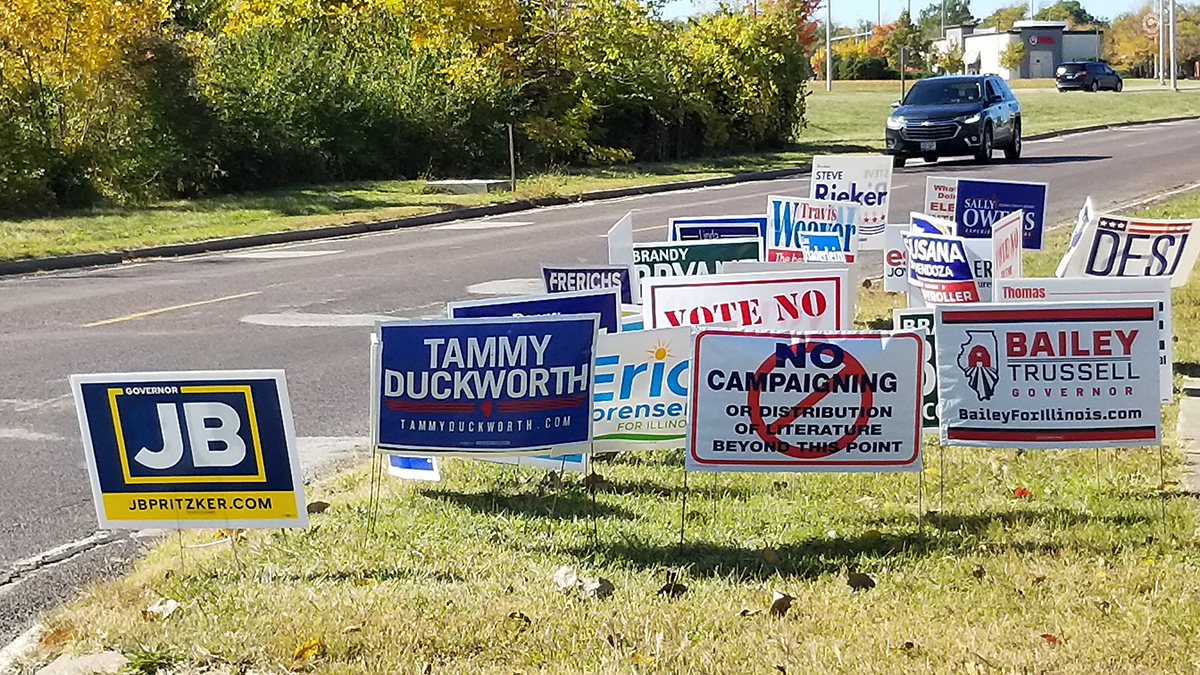Local and federal law enforcement are on alert for disruptions in the Nov. 8 election in Peoria, where threats have included possible attempts to intimidate voters, plus a campaign of correspondence apparently intended to disrupt the election’s preparations and execution.
“The Election Commission is concerned with the possibility of ‘tailgate parties’ at drop-box locations and the potential for voter intimidation,” Peoria County Election Commission Executive Director Elizabeth Gannon told the Community Word.
“As a result, the Peoria County State’s Attorney, the Peoria County Sheriff, the Illinois State Board of Elections and the FBI have been made aware of this possibility and are willing to work with the Election Commission and voters if an incident arises,” she said.
Copycat propaganda
The letters aren’t a grassroots outpouring of concern as much as “Astroturf” engineering of copycat letters promoted online by those who believe the 2020 election was stolen.
Election officials nationwide, from Florida and Oregon to the Illinois State Board of Elections in Springfield and the Peoria Election Commission on Brandywine Drive have received the same or similar letters requesting public records, threatening lawsuits, accusing officials with using voting machines that let votes be changed, implying ballots will be challenged, and seeking to throw out voter registrations. (There are state and federal tools used to routinely remove voters who’ve moved or died.)
“There was a surge in FOIA [Freedom of Information Act] requests,” Gannon said. “The Election Commission’s FOIA officer responded to all requests within the allotted time and asked for extensions when necessary.”
Most of the letters also demanded election authorities keep Cast Vote records — which they do for 22 months after elections anyway.
“The Election Commission had approval from the Illinois State Archives to dispose of 2020 general election materials on September 22,” Gannon said. “After counties across the state started receiving the same (or substantially the same) litigation threats, the Director of the Illinois State Archives and Local Records Commission, David Joens, released a memo stating that until further notice any post-2019 election materials may not legally be disposed of. As a result, we have retained these records until further notice.”
Oddly, Cast Vote records — usually maintained as huge spreadsheets sometimes used by political scientists or officials reviewing votes — are virtually useless in showing fraud, according to the nonpartisan news site Votebeat.
Behind the ‘integrity’
But that may not matter to a group calling itself the Illinois Fair Elections Coalition (which claims an affiliate named “Peoria County Voter Integrity”). Such little-known organizations — which the New York Times reported are backed by well-funded groups including the Conservative Partnership Institute and the American Project — say they’re concerned about voter fraud, but besides recruiting poll watchers to monitor proceedings, they don’t disguise partisan goals.
An Illinois Fair Elections Coalition solicitation says, “We can change Illinois from blue to red.”
None of the letters make concrete allegations, much less offer evidence, which would be virtually impossible after many investigations — including by Donald Trump’s Justice Department and the federal Election Infrastructure Government Coordinating Council — found no proof voting systems were compromised and no significant fraud in the 2020 presidential election.
More than 60 courts rejected claims of a rigged election, and a group of prominent conservatives issued a 72-page report, “Lost, Not Stolen,” that focused on six battleground states and concluded that Joe Biden won the presidency. In Illinois, Republican State Sen. Darren Bailey, GOP nominee for Illinois Governor, recently said, “There is no doubt that the constitutional process was followed and [Biden] is President.”
Extra work for election employees
Nevertheless, Trump continues to make baseless claims, and the “Big Lie” has instigated believers to challenge voting — or exploit it for political purposes.
It creates extra work for election employees, but Gannon said Peoria’s office has responded to the letters without ignoring their main duties.
“It’s a nuisance, but we’re complying with the law,” she said.
Most states limit challenges and require complaints to provide specific information about people they’re targeting, and challenges deemed frivolous can be penalized.


Recent Comments